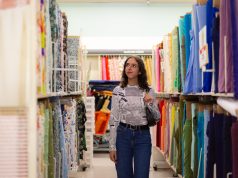Filing into the backyard of a house in Liberty City, the women of the Cleo Institute’s Empowering Resilient Women (ERW) program went back and forth on whether or not to drink the diet green tea. It had an aftertaste, said one. Nobody drank it, added another.
They greeted one another while grabbing a bite to eat from the lunch platters laid out across standard white fold-out tables like those you’d see at a family gathering, which is part of what this group has become in the last six months.
“So it’s really great to build community,” said Solamia Ortiz, 29, a communications assistant at the Miami Foundation. “Honestly it’s just insanely empowering, especially because there are a lot of systemic injustices that cause all of these disparities and unfortunately, women are interconnected in many of them.”
Ortiz is a part of the current cohort going through the ERW program, a group of 22 women aged 23 to 79 who come from different walks of life. Some work in business, and others are students. All are part of a community centered around shared struggles related to the environment, voting and more, as well as the need for support in these socially and politically challenging times.
“We are each other’s number one resource,” said Ortiz.
Women of color have been at the forefront of the climate crisis, from Michigan to California to New Orleans. They’ve suffered from a lack of resources as well as inequities. In Miami, women of color are dealing with the ocean levels rising, urbanization and temperatures rising.
“I’m worried about climate heat, sea-level rise, and plastic pollution to name a few,” said Ortiz. “Climate heat directly impacts all women due to hormonal reasons, sea level rise because Miami is ground zero and plastic pollution because it affects agriculture and is linked to cancer.”
While these issues make women particularly susceptible to these environmental crises’, they also make them better fit to learn to make a difference in this battle.
“[The women] are already extremely active in their communities. They are extremely vocal,” said Nayshma Jones, program director of ERW. “They are activists and advocates prior to entering into the empowering resilient women program.”
The Cleo Institute, an environmental organization founded in Florida in 2010 and run by women, focuses on top-to-bottom advocacy for climate change solutions. Members lobby for environmental change and offer outreach programs such as the GenCLEO Youth Empowerment Movement and Empowering Resilient Women.
Empowering Resilient Women is one of those programs. It has included one-off classes that have taught everything from the basics of the climate crisis to hurricane preparedness and how to respond to environmental stresses.
Olivia Collins is the program director at Cleo, She has been a part of it since the very beginning, starting out as a program manager.
When ERW started, there were four pillars: looking at climate change through the gender and justice lens, looking at hurricane and financial preparedness, civic engagement and building leadership skills and confidence.
“We first started in 2018 and in the beginning we did cohorts in Overtown partnering with different organizations,” said Collins. “The program has evolved quite a bit since 2018. We had to do virtual versions during COVID but this year we wanted to go back in person.”
This year they tried something different, turning it into a full course where, from October to March, a cohort of women is involved in classes to build their own gardens, listen to speakers, and discuss social justice issues.
“[The women] really like the kinesthetic portions of our program like urban gardening,” said Jones. “All the women have the opportunity to get a free garden installed in their homes. They’ve really enjoyed being outdoors and planting.”
The cohort spent two months learning the basics of gardening, practicing with seedlings and getting to know the climate of South Florida. After their courses, they were given the opportunity to install gardens in their homes – everything from full plant beds to pots for smaller apartments.
“Women of color have always been green, we have always been connected to the earth,” said Jones. “The benefit [of the gardens] is not just reengaging in practices with the land, but it also connects us back to community and this idea of mutual aid. You’re my neighbor and I have a bag of mangoes and you have a bag of tomatoes, so we trade.”
The gardens, while being a solo project throughout the program, lend themselves to conversations for these women to learn about food waste, sustainability, ways to give back to the Earth and how to focus on themselves and finding creative outlets.
The gardens help in building their communities. They also keep everyone connected in their group chat, giving progress reports, talking about their newest plants and even sending photos of dishes they’ve created with their harvests.
The gardens are one of many ERW resources that provide tools to fight the climate crisis and advance social justice issues.
Through their programs, the Cleo Institute hopes to help these women become community leaders and give them tools to tackle these pressing issues.
Jones said that she wants members of this cohort to feel more confident in their abilities as leaders.
“My biggest hope is that they see themselves as more empowered, whether that’s through education or an enhancement of the leadership they are already doing,” said Jones. “Women are born leaders, so my hope is that they feel more empowered in the sense that they have more verbiage, education and resources around these topics.”
This story was first published in the Miami Herald
































